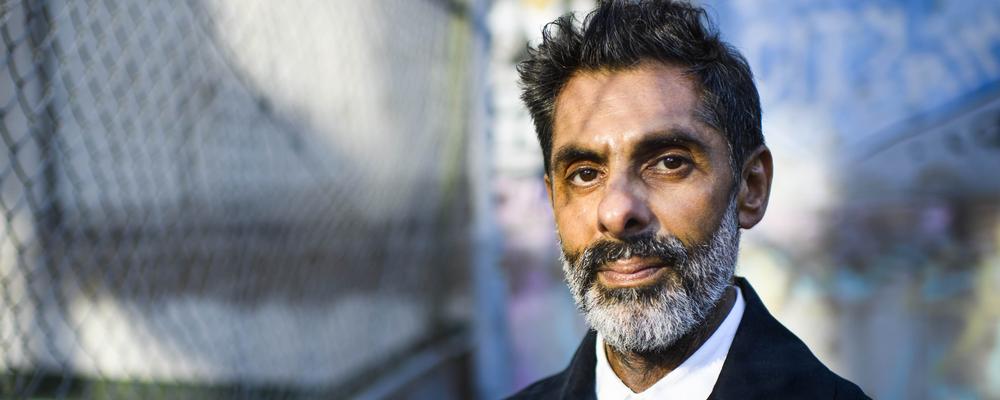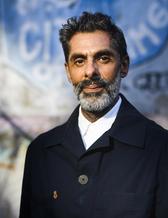
- Home
- Research
- Find research
- Onkar Kular Makes Design Experts of Us All
Onkar Kular Makes Design Experts of Us All
He is a design professor who opens the university’s doors to society and creates places where academia and the general public can meet. Onkar Kular believes that all of us make design decisions on a daily basis – and that makes us experts who are worthy of being listened to.
Onkar Kular has his office in a room on the top floor of HDK-Valand’s building on Kristinelundsgatan, where artistic subjects have been taught for more than a hundred years. The professor of design came here six years ago with an impressive list of accomplishments under his belt. From this viewpoint, over copper roofs and stone buildings, he conducts his research and practice into the role of design in society.
“Design impacts every aspect of our existence,” says Kular, “from how we live and travel to the technology we use every day. It’s a subject that shapes our lives – on many different levels. Design therefore offers fantastic opportunities from the point of view of society. One of my roles is to figure out how we can educate and support designers to take a broader and more societal approach to the field.”
He gazes thoughtfully out through the window as rain beats against it. Along the eave of the roof next door, rainwater is rushing through a gutter.
Want to make designs available
Before Kular arrived in Gothenburg, he called London home for twenty years. Through research, education, and exhibitions at institutions such as Kingston University, the Royal College of Art in London and the Museum of Modern Art in Antwerp, his work has come to be internationally recognised and is represented at the National Centre for Visual Art (CNAP) in France, for example, and the Crafts Council in England.
At the Royal College of Art, Kular headed the Platform 13 programme, which was an interdisciplinary meeting place for studying the role of design in political and economic systems and in culture and society. He is continuing to explore these topics at HDK-Valand. Together with Henric Benesch, he has organised a practice-based platform, the Right to design, which looks to make design as an everyday activity more accessible beyond class, gender, race and age.
“Although all of us are affected by design, there is a limited and often very privileged group in society that is responsible for the thinking and the decision-making around how we design and build our environments,” says Kular. “We talk a lot about equitable environments to live, work and learn in. That requires us to allow more voices to be heard and to participate in the decisions that shape our existence.”
Kular believes that all people, regardless of age and background, make creative decisions every day and have knowledge that designers and cultural workers need to listen to. “It’s a form of expertise,” he says. “We need to ask ourselves how we can design environments that give us better schools, meeting places and cities based on the knowledge that people already have – instead of trying to fulfil certain aesthetic visions of a future that is not necessarily based on anyone’s experience.”
Research that will provide knowledge exchange

Onkar Kular’s research deals with studying and developing methods that would enable us to listen carefully to experiences and ideas about design from a broader perspective. For example, the Right to Design turns to poets and hip-hop artists to see how they describe their environment.
Another of Kular’s research projects is an experimental public meeting place called the Common Room (Allmänningen), whose purpose is to develop a model for knowledge sharing and collaboration between academia and the general public.
“The Faculty of Fine, Applied and Performing Arts is a knowledge-creating social institution in the fields of art, culture, and research and is a fantastic resource – not just in terms of the knowledge produced but also the spaces, the time and the workshops it provides. By collaborating with different actors in society and allowing more people access to the university’s resources, our programmes could be more relevant and attractive to society more generally.”
So far, the Common Room has resulted in programme collaborations with Kulturhuset Blå Stället, the artist Sandi Hilal and a theatre collective that has decided to delve into questions about the relationship between guest and host and about goodwill in academic settings.
Enjoys the different research climate in Sweden
The rain has stopped running down the copper roofs outside the window. Onkar Kular picks up a yellow post-it that has fallen to the floor and puts it back up on a wall full of them, each with a word or two on it.
“I’m very happy to be here,” he says. “HDK-Valand is a generous environment for doing research, with an opportunity to work closely with teaching and to pursue your own interests. That’s very different from the research environment I experienced in England, where there’s a big gap between researchers and students.”
Kular teaches on master’s level, and one of his goals as a teacher is to prepare students for the reality that awaits them. He invites in guest lecturers from various sectors, takes students on field trips to meet with design professionals off all kinds and encourages them to consider what kind of role they want to play as designers in society. “I want to inspire them to work closely with people and allow others to understand what they do,” he says. “As designers, and as researchers in artistic fields as well, we need to be proactive and explain the value of what we do. Design is not just an instrument for making things; it can also be a tool for listening and understanding the world around us.”
Text: Åsa Rehnström


